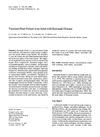Adult Kawasaki Disease: Report of Two Cases and Literature Review
May 2005
in “
Seminars in Arthritis and Rheumatism
”

TLDR Kawasaki Disease is rare and often missed in adults, who show different symptoms than children, and may benefit from early treatment.
The document summarizes findings from two new cases of adult Kawasaki Disease (KD) and a review of 57 reported cases, highlighting that KD is rare in adults and often goes unrecognized. Adults with KD typically present with arthralgia, adenopathy, and liver function abnormalities, while children more commonly experience cheilitis, meningitis, and thrombocytosis. The etiology of KD remains unknown, but immunocompromised states such as HIV may predispose individuals to the disease. Treatment with intravenous gammaglobulin (IVIG) appears to be beneficial, although it is often administered after the acute phase in adults, potentially reducing its effectiveness. Coronary aneurysms are less frequent in adults with KD, and the overall prognosis is more favorable compared to children. The document suggests that an international retrospective study is needed to validate diagnostic criteria for adult KD and improve understanding of the condition.

